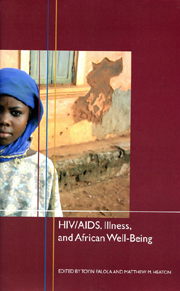Book contents
- Frontmatter
- Contents
- Acknowledgments
- Part I Context
- Part II Illness Case Studies
- 2 Waterborne Diseases and Urban Water Supply in Makurdi, Nigeria, 1927–60
- 3 Smallpox and Social Control in Colonial Saint-Louis-du-Senegal, 1850–1916
- 4 Poor Man's Trouble, Rich Man's Graveyard: A Study of Malaria and Epidemiological Sciences since the Nineteenth Century
- 5 Perceptions of Epilepsy in a Traditional Society: An Akan (Ghana) Family's Experience
- 6 Disability in Nigeria
- Part III Globalization, Development, and Health
- Part IV HIV/AIDS
- List of Contributors
- Index
- Rochester Studies in African History and the Diaspora
5 - Perceptions of Epilepsy in a Traditional Society: An Akan (Ghana) Family's Experience
from Part II - Illness Case Studies
Published online by Cambridge University Press: 05 February 2013
- Frontmatter
- Contents
- Acknowledgments
- Part I Context
- Part II Illness Case Studies
- 2 Waterborne Diseases and Urban Water Supply in Makurdi, Nigeria, 1927–60
- 3 Smallpox and Social Control in Colonial Saint-Louis-du-Senegal, 1850–1916
- 4 Poor Man's Trouble, Rich Man's Graveyard: A Study of Malaria and Epidemiological Sciences since the Nineteenth Century
- 5 Perceptions of Epilepsy in a Traditional Society: An Akan (Ghana) Family's Experience
- 6 Disability in Nigeria
- Part III Globalization, Development, and Health
- Part IV HIV/AIDS
- List of Contributors
- Index
- Rochester Studies in African History and the Diaspora
Summary
Epilepsy is one of the most misunderstood diseases in most African communities. In these communities, there are beliefs that epilepsy results from possession by an evil spirit; the sins committed by the diseased individual's parents, grandparents, any older relatives; and, in some cases, by the sins of the victim himself or herself.
It is not uncommon for very rich members of a lineage to be blamed for certain diseases—especially seizures—because excessive wealth is often viewed as having been acquired with the aid of evil spirits. Such evil spirits, if not constantly pacified, turn their anger on relatives of the wealthy individual. Sometimes, it is believed that the more harm the evil spirits can cause, the wealthier the rich individual becomes. People are therefore suspicious of “unexplained” wealth.
In rural Africa, a child who has epileptic seizures may be rejected by some societies, and people may even stay away from the house where such a patient lives. Given the fear of the disease and the stigma attached to it, it is not uncommon for families to resist acknowledging that the child has the disease. As much as possible, people avoid the embarrassment associated with it. For people who accept or acknowledge that a member of the family has the disease, the tendency has always been to isolate the diseased individual.
- Type
- Chapter
- Information
- HIV/AIDS, Illness, and African Well-Being , pp. 95 - 115Publisher: Boydell & BrewerPrint publication year: 2007



